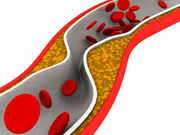Lower risk of ischemic events seen for patients with peripheral arterial disease undergoing PCI
WEDNESDAY, Aug. 31, 2016 (HealthDay News) — For patients with peripheral arterial disease (PAD), prolonged dual antiplatelet therapy (DAPT) is associated with reduced risk of ischemic events, according to a study published online Aug. 30 in the Journal of the American Medical Association. The research was published to coincide with the annual European Society of Cardiology Congress, held from Aug. 27 to 31 in Rome.
Anna Franzone, M.D., from Bern University Hospital in Switzerland, and colleagues examined the efficacy and safety of prolonged versus short DAPT in patients with PAD undergoing percutaneous coronary intervention. Data were included for 246 patients with and 1,724 patients without PAD.
The researchers found that PAD status correlated with increased risk of death and ischemic events (hazard ratio [HR], 2.80; 95 percent confidence interval [CI], 2.05 to 3.83). Prolonged versus short DAPT correlated with a reduced risk of the primary efficacy end point (composite of death, myocardial infarction, or cerebrovascular accidents) in patients with PAD (16.1 versus 27.3 percent; HR, 0.54; 95 percent CI, 0.31 to 0.95), but not in patients without PAD (9.3 versus 7.4 percent; HR, 1.28; 95 percent CI, 0.92 to 1.77), with a positive interaction (P = 0.01). Patients with PAD treated with prolonged versus short DAPT had significantly lower risk of definite or probable stent thrombosis (HR, 0.07; 95 percent CI, 0 to 1.21).
“Prolonged DAPT lowers the risk of ischemic events with no apparent bleeding liability in this high-risk group,” the authors write
One author disclosed financial ties to the pharmaceutical and medical device industries.
Copyright © 2016 HealthDay. All rights reserved.








